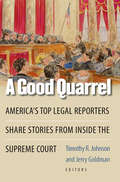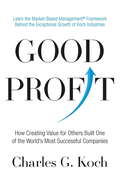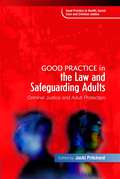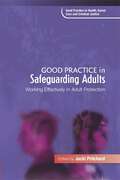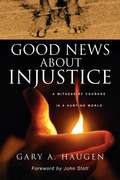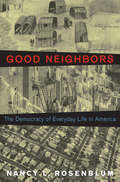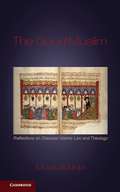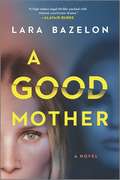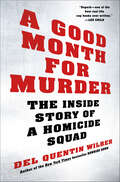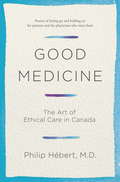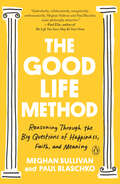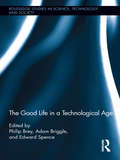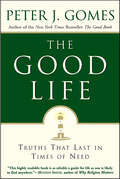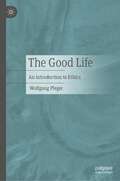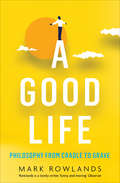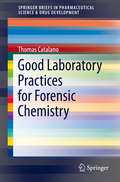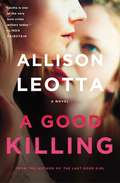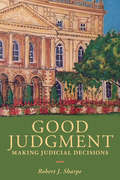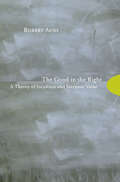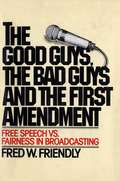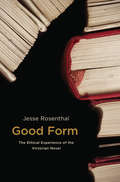- Table View
- List View
A Good Quarrel: America's Top Legal Reporters Share Stories from Inside the Supreme Court
by Timothy R. Johnson Jerry GoldmanWhile reading what top legal reporters say about some of the most important U. S. Supreme Court oral arguments in recent history, go to www. goodquarrel. com to listen to audio and hear for yourself the very style and delivery of the oral arguments that have shaped the history of our nation's highest law. See Preface for full instructions. Contributors Charles Bierbauer, CNN Lyle Denniston, scotusblog. com Fred Graham, Court TV Brent Kendall,Los Angeles Daily Journal Steve Lash,Houston Chronicle Dahlia Lithwick, Slate. com Tony Mauro, American Lawyer Media Tim O'Brien, ABC News David Savage,Los Angeles Times Greg Stohr, Bloomberg News Nina Totenberg, NPRTimothy R. Johnson teaches in the Department of Political Science and the Law School at the University of Minnesota. Jerry Goldman teaches political science at Northwestern University and directs the OYEZ Project, a multimedia archive devoted to the Supreme Court, at www. oyez. org . Cover sketch by Dana Verkouteren"Supreme Court oral arguments are good government in action. A Good Quarrelbrilliantly showcases this important aspect of the Court's work. " ---Paul Clement, Partner, King & Spalding, and former United States Solicitor General"Few legal experiences are as exhilarating as a Supreme Court oral argument---a unique art form that this superb collection brings vividly to life. " ---Kathleen Sullivan, Partner, Quinn Emanuel Urquhart Oliver and Hedges, and former Dean, Stanford Law School"[A Good Quarrel] shines a brilliant spotlight on the pivotal moment of advocacy when the Supreme Court confronts the nation's most profound legal questions. " ---Thomas C. Goldstein, Partner, Akin Gump, and Lecturer, Supreme Court Litigation, Harvard Law School and Stanford Law School"A brilliant way to understand America's most important mysterious institution. " ---Lawrence Lessig, Stanford Law School
Good Profit: How Creating Value for Others Built One of the World's Most Successful Companies
by Charles G. KochA NEW YORK TIMES BESTSELLERIn 1961, Charles Koch joined his father's Wichita-based company, then valued at $21 million. Six years later, following his father's death, he was named chairman of the board and CEO of Koch Industries, Inc. Today, Koch Industries' estimated worth is $100 billion - making it one of the largest private companies in the world. Koch exceeds the S&P 500's five-decade growth by 27-fold, and plans to double its value on average every six years. What exactly does this company do and why is it so remarkably profitable? While you won't find the Koch name on your stain-resistant carpet, stretch denim jeans, the connectors in your smartphone or your baby's ultra-absorbent diapers, Charles Koch's Market-Based Management® system, intended to generate good profit, drove these innovations and many more. Good profit results from products and services that customers vote for freely with their money; products that help improve people's lives. It results from a culture where employees are empowered to act entrepreneurially to discover customer preferences and the best ways to satisfy them. Good profit is the earnings that follow when long-term value is created for everyone - customers, employees, shareholders and society. Readers will learn to:· Craft a vision for how a business can thrive in spite of disruption and ever-changing consumer values· Find and retain a workforce possessing both virtue and talent (the first being the more important)· Award employees with ownership and decision rights based on their comparative advantages and proven contributions, rather than job title· Motivate all employees to maximise their contributions with effectively structured incentives so employees' compensation is limited only by the value they create - not budgets or company-wide policy A must-read for any leader, entrepreneur or student, as well as those who want a more civil, fair and prosperous society, GOOD PROFIT is destined to rank as one of the greatest management books of all time.
Good Practice in the Law and Safeguarding Adults: Criminal Justice and Adult Protection
by David Hewitt Penny Letts Steve Kirkpatrick Kathryn Mackay Mark Pathak Alan Noel Carter Simon Leslie Peter Sadler Geraldine Monaghan Glyn Hughes Rob Harris Teresa Gorczynska Marilyn Mornington Kathryn Stone Jacki Pritchard Adrian HughesGood Practice in the Law and Safeguarding Adults provides an up-to-date summary of developments in the legislative framework and best practice relevant to the area of adult protection work. It explains legislation that can be used in adult protection work, covering criminal and civil law, and crucial national guidance such as Achieving Best Evidence. Issues covered include confidentiality and information-sharing in adult protection work, capacity issues, police investigations, financial abuse, advocacy, witness support and honour-based violence. The book is illustrated throughout with case studies and good practice points. This book will be essential reading for anyone working with vulnerable adults, including health and social care workers, care managers, support workers, volunteers, advocates, police, probation staff, prison staff, lawyers training officers and students.
Good Practice in Safeguarding Adults: Working Effectively in Adult Protection
by Ghizala Avan Alison Bowes Gary Fitzgerald Deborah Kitson Jamieson Mornington Arwel Owen Jackie Parker Simon Leslie Peter Sadler Seena Fazel Sherry Bien Macintosh Marilyn Mornington Lucy Naven Jacki Pritchard Adrian Hughes Adrian HayesGood Practice in Safeguarding Adults provides an up to date and topical overview of developments in policy, guidance, legislation and practice in the area of adult protection. The book aims to broaden thinking about adult abuse, assesses alternative models of practice such as criminal justice and welfare, and covers groups who may be overlooked, such as people with brain injuries, older prisoners and adults within the black and minority ethnic communities. Issues covered include domestic violence and honour-based crime, abuse in institutions, financial abuse, and risk assessment in adult protection. The book is illustrated throughout with case studies, and also gives a voice to the victims of adult abuse who can be forgotten in a working environment that emphasises target performance, indicators, standards, star ratings, paperwork and correct use of terminology. This book will be essential reading for anyone working with vulnerable adults, including social workers, care managers, care workers, health care staff, police, probation officers, staff within the prison system, advocates, volunteers, training officers and students.
Good News About Injustice: A Witness of Courage in a Hurting World
by Gary A. HaugenGary Haugen says "the good news about injustice is that God is against it!" Offering his own and others' stories alongside proven, practical strategies, he shows how you too can stand against injustice wherever it occurs.
Good Neighbors: The Democracy of Everyday Life in America
by Nancy L. Rosenblum"Love thy neighbor" is an impossible exhortation. Good neighbors greet us on the street and do small favors, but neighbors also startle us with sounds at night and unleash their demons on us, they monitor and reproach us, and betray us to authorities. The moral principles prescribed for friendship, civil society, and democratic public life apply imperfectly to life around home, where we interact day to day without the formal institutions, rules of conduct, and means of enforcement that guide us in other settings. In Good Neighbors, Nancy Rosenblum explores how encounters among neighbors create a democracy of everyday life, which has been with us since the beginning of American history and is expressed in settler, immigrant, and suburban narratives and in novels, poetry, and popular culture. During disasters, like Hurricane Katrina, the democracy of everyday life is a resource for neighbors who improvise rescue and care. Degraded, this framework can give way to betrayal by neighbors, as faced by the Japanese Americans interned during World War II, or to terrible violence such as the lynching of African Americans. Under extreme conditions the barest act of neighborliness is a bulwark against total ethical breakdown. The elements of the democracy of everyday life--reciprocity, speaking out, and "live and let live"--comprise a democratic ideal not reducible to public principles of justice or civic virtue, but it is no less important. The democracy of everyday life, Rosenblum argues, is the deep substrate of democracy in America and can be its saving remnant.
The Good Muslim
by Mona SiddiquiIn this unusual, thought-provoking and beautifully written book, Mona Siddiqui reflects upon key themes in Islamic law or theology. She has selected these topics, which range through discussions about friendship, divorce, drunkenness, love, slavery, and ritual slaughter, in part because they are of particular interest to her, and in part because they reveal fascinating insights into Islamic ethics, and the way in which arguments developed in medieval juristic discourse. These pre-modern religious works contained a richness of thought, hesitation and speculation on a wide range of topics, which were socially relevant but also presented intellectual challenges to the scholars for whom God's revelation could be understood in diverse ways. These subjects of course remain very relevant today, both for practicing Muslims and for scholars of Islamic law and religious studies, and the book shows just how these debates resonate in contemporary Islamic thought. Mona Siddiqui is an astute and articulate interpreter who relays complex ideas about the Islamic tradition with great clarity. These are important attributes for a book which, as the author acknowledges, charts her own journey through the classical texts, and reflects upon how the principles expounded there have guided her own thinking and impacted on her teaching and research.
A Good Mother: A Novel
by Lara BazelonA Library Journal Best Debut Novel of Spring and Summer 2021"A high-stakes legal thriller packed with intense courtroom drama." -Alafair BurkeA gripping debut thriller about two young mothers, one shocking murder and a court case that puts them both on trial.When a soldier is found stabbed through the heart at a US Army base, there is no doubt that his wife, Luz, is to blame. But was it an act of self-defense? An attempt to save her infant daughter? Or the cold-blooded murder of an innocent man?Ambitious public defender Abby is determined to win at all costs. As a new mother herself, she wants to keep Luz out of prison and with her daughter. But when the surprises stack up and shocking new evidence emerges, Abby realizes the task proves far more difficult than she suspected and will require a terrible sacrifice.As the trial hurtles toward an outcome no one expects, Abby, Luz and a captivated jury are forced to answer the question that will decide everything—what does it mean to be a good mother?&“Lara Bazelon combines a riveting courtroom thriller with a nuanced and thought-provoking examination of gender, race, and justice. Helmed by an intelligent, complex, and flawed protagonist, A Good Mother is a beautifully written debut that kept me turning the pages late into the night.&” —Angie Kim, author of Miracle Creek"Sexy, shrewd, and wholly contemporary, A Good Mother takes pitch-perfect characters, a page-whipping plot, and themes about marriage, lust, betrayal, and the juggling of new motherhood plus a hard-driving career and mixes it all into a deeply perceptive legal thriller that made me drop everything else and just READ." —Cathi Hanauer, New York Times bestselling author of Gone, The Bitch in the House and The Bitch Is Back
A Good Month for Murder: The Inside Story of a Homicide Squad
by Del Quentin WilberBestselling author Del Quentin Wilber tells the inside story of how a homicide squad---a dedicated, colorful team of detectives—does its almost impossible jobTwelve homicides, three police-involved shootings and the furious hunt for an especially brutal killer--February 2013 was a good month for murder in suburban Washington, D.C.After gaining unparalleled access to the homicide unit in Prince George's County, which borders the nation's capital, Del Quentin Wilber begins shadowing the talented, often quirky detectives who get the call when a body falls. After a quiet couple of months, all hell breaks loose: suddenly every detective in the squad is scrambling to solve one shooting and stabbing after another. Meanwhile, the entire unit is obsessed with a stone-cold "red ball," a high-profile case involving a seventeen-year-old honor student attacked by a gunman who kicked down the door to her house and shot her in her bed.Murder is the police investigator's ultimate crucible: to solve a killing, a detective must speak for the dead. More than any recent book, A Good Month for Murder shows what it takes to succeed when the stakes couldn't possibly be higher.
Good Medicine
by Philip HebertAward-winning physician Philip C. Hébert creates a brave and intimate portrait of the complex ethical imperatives at the heart of good medicine: doctors do not have all the answers; patients must be heard; and their needs, desires, fears, and experiences must be reflected in how practitioners look after them. Medical science continues to advance to previously unimagined heights in its diagnostic and treatment capabilities. With these advances, however, come unexpected ethical dilemmas for practitioners, patients, and families. In Good Medicine, Dr. Hébert approaches these questions of pressing and fundamental importance from the dual point of view of acclaimed physician and long-time patient. With remarkable balance and sensitivity, he explores a range of politically, constitutionally, and ethically contentious matters, including assisted suicide, treatment refusal and suspension, and the overall allocation of medical resources. Hébert pairs his artful analysis with the real-life, often deeply moving stories of those who have lived these challenges. Hébert offers piercing and compassionate insight into the relationship between patients and medical professionals, and guides readers towards the open and empathetic communication needed to ensure good medicine for everyone.From the Hardcover edition.
A Good Man with a Dog: A Retired Game Warden's 25 Years in the Maine Woods
by Kate Clark Flora Roger GuayA game warden’s journey from the woods of Maine to the swamps of New Orleans. When Roger Guay’s father died in a tragic fishing accident, a kind game warden helped him through the loss. Inspired by this experience, as well as his love of the outdoors, Guay became a game warden and certified K9 handler, beginning a successful career that would span twenty-five years and see him establish canine units as a staple of the game warden service. Guay takes readers into the patient, watchful world of a warden catching poachers and protecting pristine wilderness, and the sometimes CSI-like reconstruction of deer- and moose-poaching scenes. Guay searches for lost hunters and hikers, estimating that over the years, he has pulled more than two hundred bodies out of Maine’s north woods. His frequent companion is a little brown lab named Reba, who can find discarded weapons, ejected shells, hidden fish, and missing people.A Good Man with a Dog explores Guay’s life as he and his canine partners are exposed to increasingly terrible events, from tracking down hostile poachers to searching for victims of violent crimes, including a year-long search for the hidden graves of two babies buried by a Massachusetts cult. He witnessed firsthand FEMA’s mismanagement of the post-Katrina cleanup efforts in New Orleans, an experience that left him scarred and disheartened. But he found hope with the support of family and friends, and eventually returned to the woods he knew and loved from the days of his youth.
The Good Life Method: Reasoning Through the Big Questions of Happiness, Faith, and Meaning
by Meghan Sullivan Paul BlaschkoTwo Philosophers Ask and Answer the Big Questions About the Search for Faith and HappinessFor seekers of all stripes, philosophy is timeless self-care. Notre Dame philosophy professors Meghan Sullivan and Paul Blaschko have reinvigorated this tradition in their wildly popular and influential undergraduate course &“God and the Good Life,&” in which they wrestle with the big questions about how to live and what makes life meaningful. Now they invite us into the classroom to work through issues like what justifies our beliefs, whether we should practice a religion and what sacrifices we should make for others—as well as to investigate what figures such as Aristotle, Plato, Marcus Aurelius, Iris Murdoch, and W. E. B. Du Bois have to say about how to live well. Sullivan and Blaschko do the timeless work of philosophy using real-world case studies that explore love, finance, truth, and more. In so doing, they push us to escape our own caves, ask stronger questions, explain our deepest goals, and wrestle with suffering, the nature of death, and the existence of God.Philosophers know that our &“good life plan&” is one that we as individuals need to be constantly and actively writing to achieve some meaningful control and sense of purpose even if the world keeps throwing surprises our way. For at least the past 2,500 years, philosophers have taught that goal-seeking is an essential part of what it is to be human—and crucially that we could find our own good life by asking better questions of ourselves and of one another. This virtue ethics approach resonates profoundly in our own moment.The Good Life Method is a winning guide to tackling the big questions of being human with the wisdom of the ages.
The Good Life in a Technological Age (Routledge Studies in Science, Technology and Society)
by Philip Brey Adam Briggle Edward SpenceModern technology has changed the way we live, work, play, communicate, fight, love, and die. Yet few works have systematically explored these changes in light of their implications for individual and social welfare. How can we conceptualize and evaluate the influence of technology on human well-being? Bringing together scholars from a cross-section of disciplines, this volume combines an empirical investigation of technology and its social, psychological, and political effects, and a philosophical analysis and evaluation of the implications of such effects.
A Good Life: For You And Your Relative With A Disability
by Al EtmanskiA Good Life offers a very different perspective about what is truly important when contemplating the future of people with disabilities. A Good Life catapults over the traditional supports and services available to most people with disabilities and suggests another approach.
The Good Life: Truths That Last in Times of Need
by Peter J. GomesThe author of the New York Times bestseller The Good Book champions the recovery of the Western moral tradition.
The Good Life: An Introduction to Ethics
by Wolfgang PlegerThe book offers a historical-systematic overview of the most important concepts of ethics, each of which is presented using three to four exemplary main representatives. Central quotations allow textual access to the respective position, which is explained compactly and clearly. With the title “The Good Life” the author points to the anthropological basis of all ethics. The book is interdisciplinary in nature, incorporating philosophical approaches as well as those from the fields of theology, biology, psychology, sociology, and politics. For the 2nd edition, the book will be expanded to include the chapter “Education - Pedagogical Ethics” and a chapter on universal human rights.
A Good Life: Philosophy from Cradle to Grave
by Mark RowlandsFramed by the story of a son finding his late father&’s journal, a meditation on love, meaning, and morality by the author of The Philosopher and the Wolf. Myshkin was born on a certain day and died on a certain day—and some things happened to him in between. These things presented him with ethical questions, and this book is a record of his attempt to answer those questions. Discovered in 2054 by his son after Myshkin's death in the Florida Keys, A Good Life is one man's reckoning with the life he has led and the choices he made. It is at once a philosophical handbook for living and a page-turning narrative, following one man's life (birth, death, education, religion, morality, illness, and so on) told through a philosophical lens. It is a riveting examination of the ethical questions we face, and the decisions we must make, and a defense of the idea that at the beating heart of morality we find love. Sometimes profoundly funny, sometimes deeply serious, A Good Life is as readable as a novel and as provocative as the best philosophy. It is the finest work to date by a charming and brilliant thinker. &“A lovely writer, funny and moving.&”—Observer
The Good Lawyer
by Adrian EvansThe Good Lawyer explores the ethical and professional challenges that confront people who work in the law - or are considering it - and offers principled and pragmatic advice about how to overcome such challenges. This book takes a holistic approach that begins with your innate humanity. It urges you to examine your motives for seeking a career in law, to foster a deep understanding of what it means to be 'good', and to draw on your virtue and judgement when difficult choices arise, rather than relying on compliance with rules or codes. The Good Lawyer analyses four important areas of legal ethics - truth and deception, professional secrets, conflicts of interest, and professional competence - and explains the choices that are available when determining a course of moral action. It links theory to practice, and includes many examples, diagrams and source documents to illustrate ethical concepts, scenarios and decision making.
Good Laboratory Practices for Forensic Chemistry
by Thomas CatalanoGood Laboratory Practices for Forensic Chemistry acknowledges the limitations that often challenge the validity of data and resultant conclusions. Eight chapters examine current practices in analytical chemistry as well as business practices, guidelines and regulations in the pharmaceutical industry to offer improvements to current practices in forensic chemistry. It discusses topics ranging from good manufacturing practices (GMP), good laboratory practices (GLP), the International Conference on Harmonisation (ICH), quality assurance (QA), and quality risk management (QRM), among others. This book is a guide for scientists, professors, and students interested in expanding their knowledge of forensic chemistry.
A Good Killing: A Novel (Anna Curtis Series #4)
by Allison LeottaFormer federal prosecutor and critically acclaimed author Allison Leotta's spellbinding thriller follows prosecutor Anna Curtis as she heads home to Michigan to defend her sister in a case that will bring her to her knees.Newly single after calling off her wedding, sex-crimes prosecutor Anna Curtis is summoned home to Michigan when her old high school coach--a hometown hero--is killed in a fiery car crash. But Anna isn't there to prosecute a crime, she's home to support her innocent sister, Jody, who has been wrongfully accused of the coach's murder. But maybe Jody isn't so innocent after all? The police are convinced that Jody was having an affair with the married coach and killed him out of jealousy. As Anna investigates with the help of her childhood friend Cooper Bolden--an Afghan War veteran with a secret of his own--she slowly peels back the facade of her all-American hometown and discovers that no one is telling the truth about the coach, not even the people she thought she knew best. When the town rallies against them, threatening not just Jody's liberty but both sisters' lives, Anna resolves to do everything she can to save her sister and defend the only family she has left. In her best book yet, Leotta, "a highly entertaining storyteller" (George Pelecanos), explores the limits of vigilante justice, the bonds of sisterhood, and the value of the truth.
Good Judgment: Making Judicial Decisions
by Robert SharpeGood Judgment, based upon the author's experience as a lawyer, law professor, and judge, explores the role of the judge and the art of judging. Engaging with the American, English, and Commonwealth literature on the role of the judge in the common law tradition, Good Judgment addresses the following questions: What exactly do judges do? What is properly within their role and what falls outside? How do judges approach their decision-making task? In an attempt to explain and reconcile two fundamental features of judging, namely judicial choice and judicial discipline, this book explores the nature and extent of judicial choice in the common law legal tradition and the structural features of that tradition that control and constrain that element of choice. As Sharpe explains, the law does not always provide clear answers, and judges are often left with difficult choices to make, but the power of judicial choice is disciplined and constrained and judges are not free to decide cases according to their own personal sense of justice. Although Good Judgment is accessibly written to appeal to the non-specialist reader with an interest in the judicial process, it also tackles fundamental issues about the nature of law and the role of the judge and will be of particular interest to lawyers, judges, law students, and legal academics.
The Good in the Right: A Theory of Intuition and Intrinsic Value
by Robert AudiThis book represents the most comprehensive account to date of an important but widely contested approach to ethics--intuitionism, the view that there is a plurality of moral principles, each of which we can know directly. Robert Audi casts intuitionism in a form that provides a major alternative to the more familiar ethical perspectives (utilitarian, Kantian, and Aristotelian). He introduces intuitionism in its historical context and clarifies--and improves and defends--W. D. Ross's influential formulation. Bringing Ross out from under the shadow of G. E. Moore, he puts a reconstructed version of Rossian intuitionism on the map as a full-scale, plausible contemporary theory. A major contribution of the book is its integration of Rossian intuitionism with Kantian ethics; this yields a view with advantages over other intuitionist theories (including Ross's) and over Kantian ethics taken alone. Audi proceeds to anchor Kantian intuitionism in a pluralistic theory of value, leading to an account of the perennially debated relation between the right and the good. Finally, he sets out the standards of conduct the theory affirms and shows how the theory can help guide concrete moral judgment. The Good in the Right is a self-contained original contribution, but readers interested in ethics or its history will find numerous connections with classical and contemporary literature. Written with clarity and concreteness, and with examples for every major point, it provides an ethical theory that is both intellectually cogent and plausible in application to moral problems.
The Good Guys, the Bad Guys and the First Amendment: Free Speech Vs. Fairness in Broadcasting
by Fred W. FriendlyUnlike newspapers, TV and radio broadcasting is subject to government regulation in the form of the FCC and the Fairness Doctrine, which requires stations "to devote a reasonable amount of broadcast time to the discussion of controversial issues" and "to do so farily, in order to afford reasonable opportunity for opposing viewpoints." In this provocative book, Fred W. Friendly, former president of CBS News examines the complex and critical arguments both for and against the Fairness Doctrine by analyzing the legal battles it has provoked.
Good Governance for Pension Schemes
by Paul Thornton Donald FlemingRegulatory and market developments have transformed the way in which UK private sector pension schemes operate. This has increased demands on trustees and advisors and the trusteeship governance model must evolve in order to remain fit for purpose. This volume brings together leading practitioners to provide an overview of what today constitutes good governance for pension schemes, from both a legal and a practical perspective. It provides the reader with an appreciation of the distinctive characteristics of UK occupational pension schemes, how they sit within the capital markets and their social and fiduciary responsibilities. Providing a holistic analysis of pension risk, both from the trustee and the corporate perspective, the essays cover the crucial role of the employer covenant, financing and investment risk, developments in longevity risk hedging and insurance de-risking, and best practice scheme administration.
Good Form: The Ethical Experience of the Victorian Novel
by Jesse RosenthalWhat do we mean when we say that a novel's conclusion "feels right"? How did feeling, form, and the sense of right and wrong get mixed up, during the nineteenth century, in the experience of reading a novel? Good Form argues that Victorian readers associated the feeling of narrative form--of being pulled forward to a satisfying conclusion--with inner moral experience. Reclaiming the work of a generation of Victorian "intuitionist" philosophers who insisted that true morality consisted in being able to feel or intuit the morally good, Jesse Rosenthal shows that when Victorians discussed the moral dimensions of reading novels, they were also subtly discussing the genre's formal properties.For most, Victorian moralizing is one of the period's least attractive and interesting qualities. But Good Form argues that the moral interpretation of novel experience was essential in the development of the novel form--and that this moral approach is still a fundamental, if unrecognized, part of how we understand novels. Bringing together ideas from philosophy, literary history, and narrative theory, Rosenthal shows that we cannot understand the formal principles of the novel that we have inherited from the nineteenth century without also understanding the moral principles that have come with them. Good Form helps us to understand the way Victorians read, but it also helps us to understand the way we read now.
